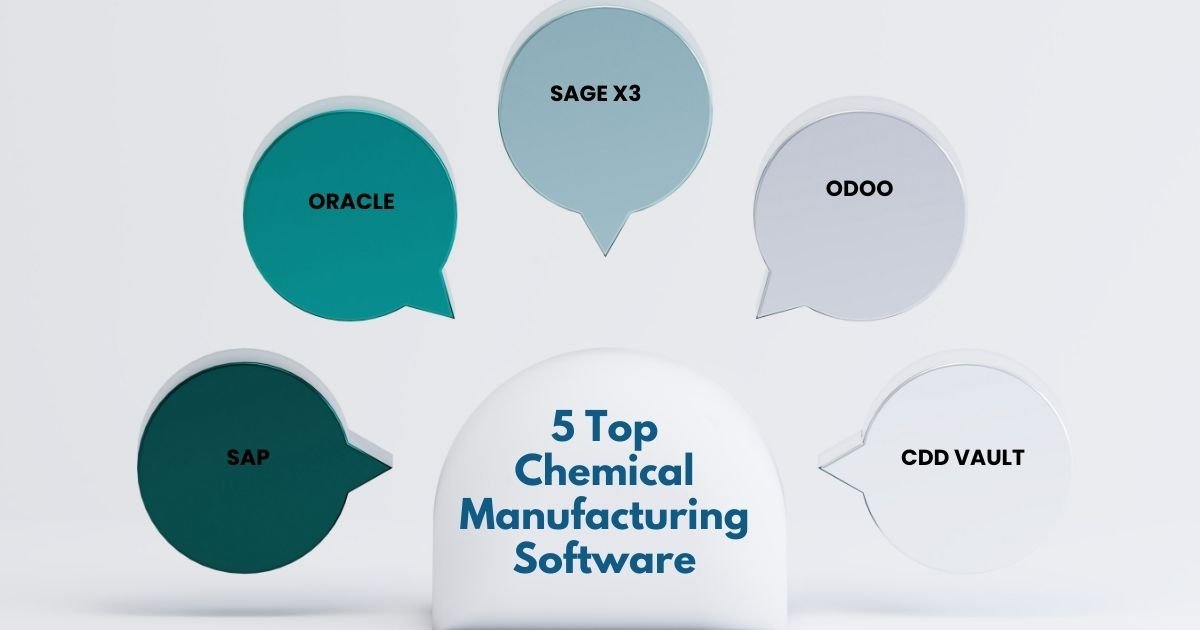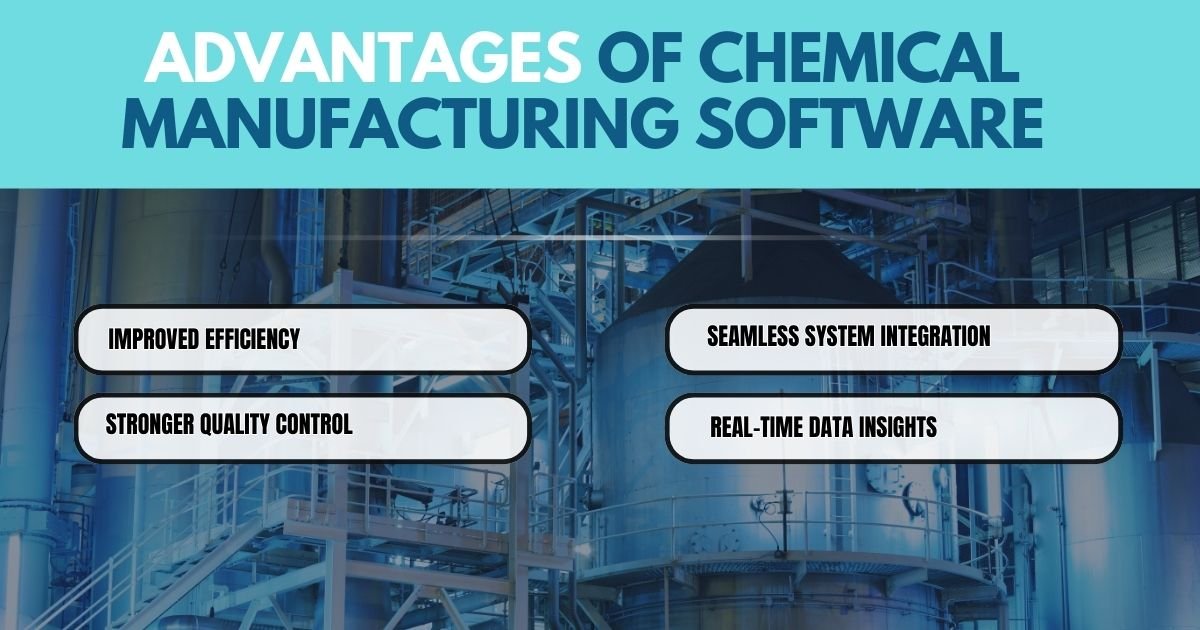Did you know that 45% of chemical enterprises are investing in digital solutions like ERP systems to improve efficiency and compliance?
These systems help manage production, follow regulations, and ensure accurate chemical formulations. As the industry evolves, relying on chemical manufacturing software has become essential for maintaining quality and meeting strict safety standards.
But with several options available, choosing the right chemical manufacturing software depends on a company’s specific needs. Understanding what these software solutions offer and how they work can help businesses make informed decisions.
What is Chemical Manufacturing Software?
Chemical manufacturing software is a specialized tool designed to manage operations in the chemical industry efficiently. It is used by companies that produce pharmaceuticals, fertilizers, pesticides, cosmetic chemicals, construction chemicals, and more.
The software offers tools for tracking inventory, monitoring quality, ensuring compliance with regulations, and managing production schedules. It is also customizable to fit the unique needs of any chemical company.
In addition, some of this software can integrate easily with Enterprise Resource Planning (ERP) systems, Supply Chain Management (SCM) software, and Laboratory Information Management Systems (LIMS), making the manufacturing process faster, easier, and more efficient.
Important Features of Chemical Manufacturing Software
- Inventory Management – Tracks raw materials and finished products to ensure optimal stock levels.
- Production Scheduling – Organizes production runs to reduce errors, shorten production time, minimize waste, and boost productivity.
- Quality Control:
Monitors product quality and performance to ensure processes meet standards. - Regulatory Compliance – Tracks and reports adherence to industry regulations, simplifying compliance and reducing costs.
5 Top Chemical Manufacturing Software

The chemical industry frequently uses chemical manufacturing software, including popular options such as SAP, Oracle, Sage X3, Odoo, and CDD Vault. Each solution has unique features, and the choice depends on a manufacturer’s needs and business situation.
1. SAP
SAP offers solutions for many industries, including chemicals. Their primary product, SAP S/4HANA Cloud, supports digital transformation by providing real-time insights, improving decision-making, and optimizing supply chains.
It also includes Transportation Management for logistics and an Environment, Health, and Safety Management solution for regulatory compliance.
- Features – SAP S/4HANA Cloud provides real-time insights, digital transformation support, and integrated tools for supply chain management, production planning, logistics, and safety compliance.
- Strengths – It is robust and well-suited for large, complex operations, with a strong focus on efficiency and regulatory adherence.
2. Oracle
Oracle’s software for the chemical industry covers supply chain management, finance, regulatory compliance, logistics, and production planning. The Oracle E-Business Suite includes modules for quality management, manufacturing, and inventory control, helping companies enhance efficiency and product quality.
Additional tools, such as Oracle Transportation and Oracle Agile Product Lifecycle Management, further support logistics and regulatory needs.
- Features – Oracle E-Business Suite provides modules for quality management, manufacturing, inventory control, supply chain operations, financials, and regulatory compliance, along with transportation and product lifecycle management.
- Strengths – Its comprehensive integration streamlines processes and ensures high-quality standards throughout the manufacturing cycle.
3. Sage X3
Sage X3 is an ERP system for the chemical industry that integrates modules for supply chain management, inventory tracking, quality control, customer relationship management, and production planning. It is popular among companies with complex supply chains and offers advanced analytics for real-time insights.
- Features – Sage X3 integrates modules for supply chain management, inventory tracking, quality control, customer relationship management, and production planning, plus advanced analytics for real-time insights.
- Strengths – It is highly customizable and ideal for managing complex supply chains, supporting data-driven decisions and efficient overall operations.
4. Odoo
Odoo is an ERP system suitable for businesses of all sizes, helping chemical manufacturers manage production, inventory, sales, and finance.
It defines production stages, tracks raw materials and finished products, and schedules production and shipments. Its robust inventory management and quality control features help reduce waste and maintain high-quality standards.
- Features – Odoo manages production processes, inventory, sales, and finance. It tracks raw materials, finished products, and production stages, and includes strong quality control and automated inventory management.
- Strengths – Its flexibility and user-friendly interface make it a cost-effective solution for optimizing production and reducing waste.
5. CDD Vault
CDD Vault is a cloud-based platform intended for chemical manufacturers and companies involved in drug development. It organizes production processes, manages clinical trials, and maintains security and regulatory compliance.
The platform collects, stores, and analyzes data on compounds, experiments, and chemical structures, offering real-time insights and data visualization to support decision-making. It also adheres to high security standards, including HIPAA and GDPR, ensuring sensitive data is well-protected.
- Features – CDD Vault organizes compound libraries, experimental results, and chemical structures, and offers tools for data visualization and real-time insights.
- Strengths – It is designed for research and development, ensuring high security and compliance with standards such as HIPAA and GDPR, which is essential for managing sensitive chemical data.
Advantages of Chemical Manufacturing Software

Chemical manufacturing software enhances productivity, efficiency, and compliance. Here are four important benefits that help businesses streamline operations and maintain quality standards:
- Improved Efficiency
Automating processes reduces manual data entry, minimizes errors, and speeds up operations. This allows manufacturers to focus on production rather than administrative tasks, leading to faster turnaround times and higher output. - Stronger Quality Control
Built-in quality monitoring tools help ensure that every product meets industry standards and safety regulations. With real-time tracking and automated alerts, manufacturers can quickly identify and correct inconsistencies before they become major issues. - Seamless System Integration
The software connects with ERP and CRM systems, creating a smooth workflow across departments. This integration eliminates data silos, improves communication, and ensures all teams have access to accurate, up-to-date information. - Real-Time Data Insights
Advanced reporting and analytics provide instant access to key performance metrics. Manufacturers can make informed decisions, optimize processes, and predict potential challenges before they disrupt production.
Don’t Get Left Behind
The chemical industry is evolving, and relying on outdated systems is like trying to steer a ship without a map. Chemical manufacturing software simplifies operations, ensures compliance, and keeps your business competitive.
Without it, inefficiencies stack up, mistakes slip through, and costs spiral out of control. Why struggle with manual processes when automation can do the heavy lifting?
If nearly half of chemical companies are already investing in digital solutions, why wait? The right software helps you work smarter, cut costs, and maintain quality without stress. Delays in upgrading could mean falling behind competitors who have already optimized their operations.
Now is the time to act—invest in the right tools and set your business up for long-term success.
FAQs
What is ERP chemical software, and how does it benefit manufacturers?
ERP chemical software is a specialized system that helps chemical manufacturers manage production, inventory, supply chains, and regulatory compliance. It improves efficiency by automating workflows, reducing errors, and ensuring accurate data tracking across all operations.
How does chemical industry software help with safety and compliance?
Chemical industry software includes features for tracking hazardous materials, maintaining safety protocols, and ensuring regulatory compliance. It helps businesses adhere to industry standards by providing automated reporting, audit trails, and real-time monitoring of production processes.
What is chemical asset management software, and why is it important?
Chemical asset management software helps track and maintain equipment, machinery, and critical assets in chemical manufacturing. It ensures proper maintenance schedules, reduces downtime and improves operational efficiency by preventing equipment failures before they impact production.
How does chemical compliance software assist with regulatory requirements?
Chemical compliance software simplifies adherence to environmental, health, and safety regulations by managing documentation, automating compliance reporting, and tracking chemical usage. It helps companies avoid legal risks and ensures all processes align with industry standards.
